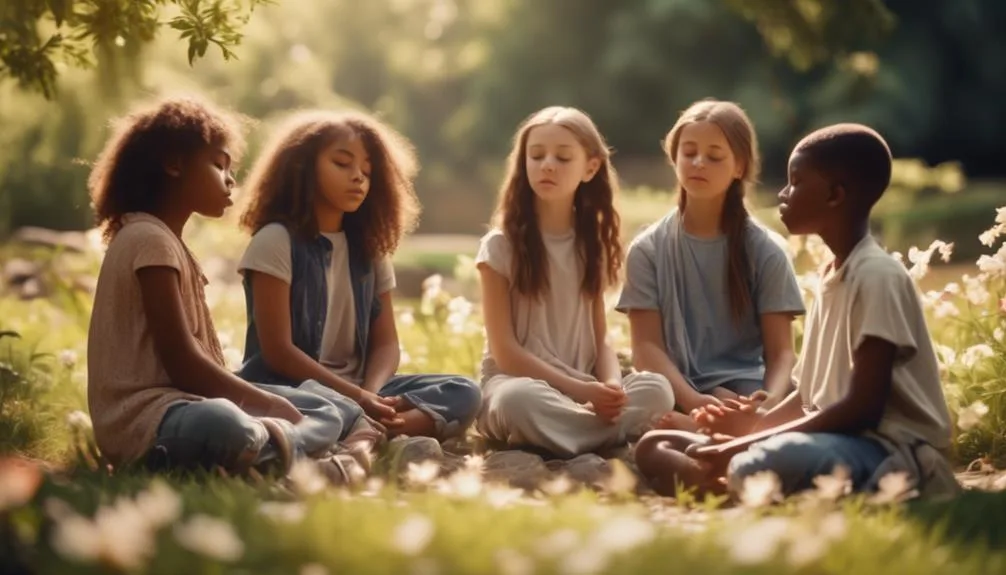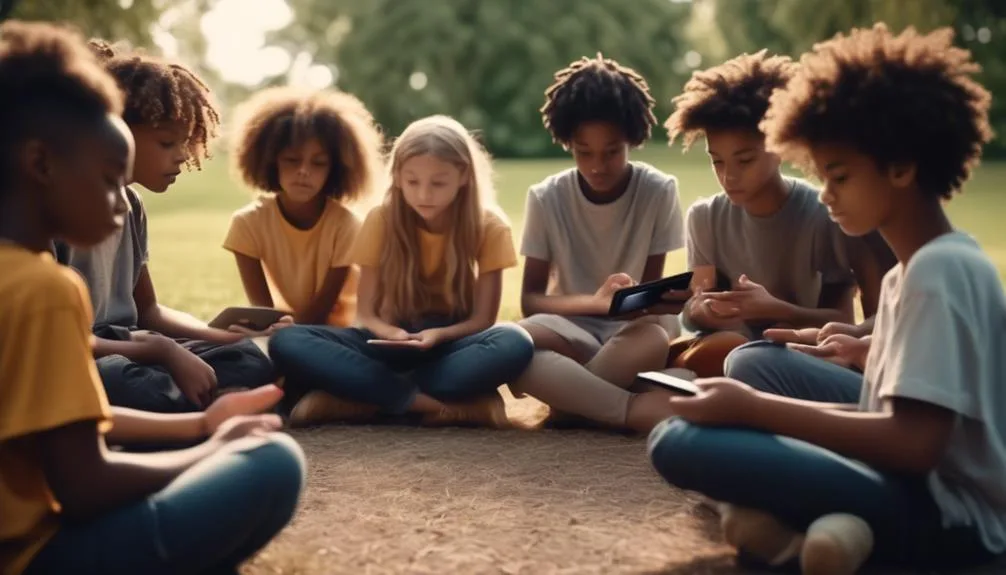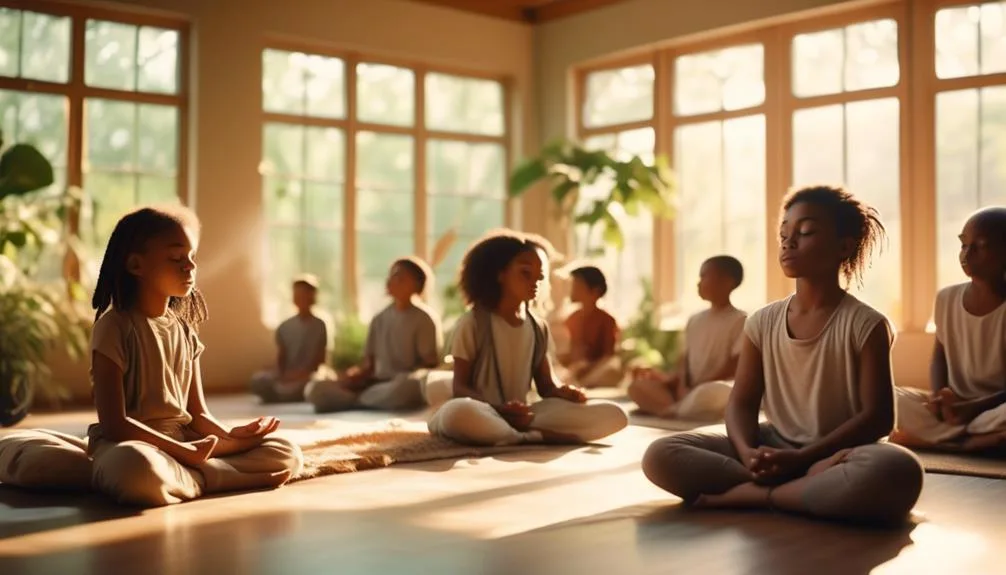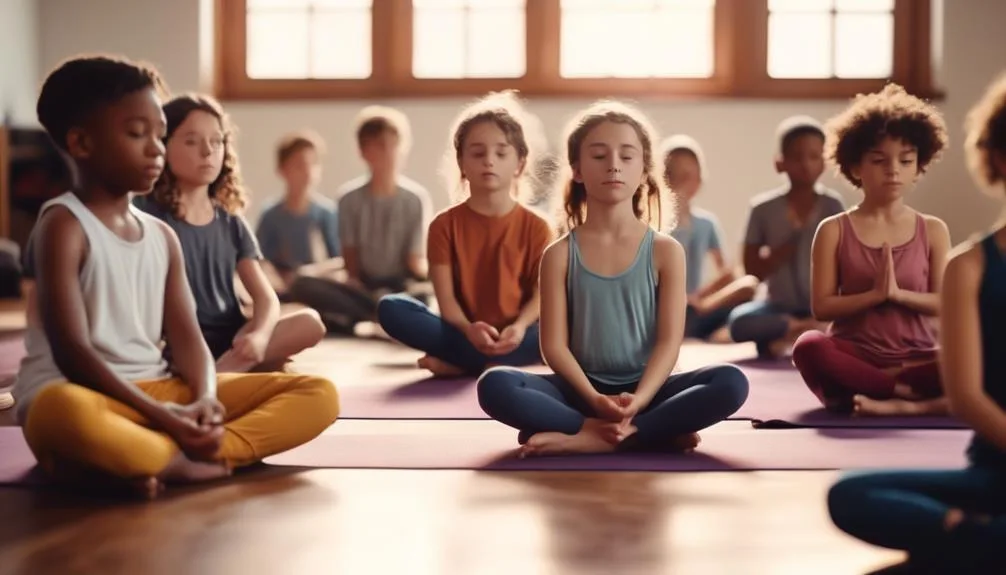Are you curious about whether mindfulness can truly unlock its power in children and teens? As parents and educators, we often wonder if teaching mindfulness to young minds is really effective and worth the effort.
In this article, we will explore the truth behind the theory of unlocking the power of mindfulness in children and teens. We will delve into engaging activities and share valuable tips to help you introduce and cultivate mindfulness in your young ones.
So, if you're ready to discover the potential benefits and practical strategies for incorporating mindfulness into the lives of children and teens, keep reading to find out more.
Key Takeaways
- Mindfulness activities and practices can be beneficial for children and teenagers.
- It is important to use age-appropriate language and examples when teaching mindfulness.
- Incorporating mindfulness into daily routines and creating a calm environment is helpful.
- Mindfulness can improve focus, emotional regulation, and social skills in children and teens.
Mindfulness Activities for Children & Teens
Mindfulness activities for children and teens can provide valuable tools for cultivating focus, emotional regulation, and social skills. Engaging in mindful crafts and mindfulness exercises for teens can be a fun and effective way to introduce mindfulness to young ones.
Mindful crafts involve activities like coloring, drawing, or creating artwork with a focus on being present in the moment. This allows children and teens to tap into their creativity while also learning to be mindful.
Mindfulness exercises for teens can include practices such as deep breathing, body scans, or guided meditations. These exercises help teens develop self-awareness, reduce stress, and improve their ability to regulate their emotions.
Tips for Teaching Mindfulness to Kids and Teenagers

When teaching mindfulness to kids and teenagers, it's important to create a supportive and engaging environment that allows them to explore and cultivate this valuable practice. To ensure readiness, explain what mindfulness is and what it's not, using age-appropriate language and examples.
As a model, practice mindfulness together and assure them that it's okay to lose focus and guide themselves back. Finish the practice by doing something enjoyable together, reinforcing the positive experience.
Visual aids like pictures, objects, and movements can help capture their attention. Encourage deep breathing exercises to help them relax and focus. Introduce mindfulness through fun activities, games, and storytelling.
Incorporate mindfulness into daily routines and create a calm and quiet environment for practice. Teach gratitude and kindness as part of mindfulness, and offer guided meditations. Provide resources like books and apps for further practice.
Mindfulness Games, YouTube Videos, and Apps to Support Teachings

To enhance mindfulness teachings for children and teens, incorporating interactive games, engaging YouTube videos, and user-friendly apps can provide additional support and reinforcement for their mindfulness practice.
Mindful coloring benefits can be experienced through coloring apps and books that promote relaxation and focus. These activities allow children and teens to engage their senses and explore their creativity while cultivating mindfulness.
Mindful YouTube videos offer a wide range of guided meditations, breathing exercises, and relaxation techniques that can help children and teens unwind and find inner calm. These videos often feature soothing visuals and calming music to create a peaceful environment for mindfulness practice.
Additionally, there are various apps available that offer mindfulness exercises, guided meditations, and timers to support children and teens in their mindfulness journey. These resources can be valuable tools in teaching and reinforcing mindfulness practices for children and teens.
Mindfulness Training Classes for Children With Anxiety

Mindfulness training classes can provide valuable support and guidance for children experiencing anxiety. These classes offer a structured environment where children can learn mindfulness techniques specifically tailored to help them manage their anxiety.
One approach that has been effective is Mindfulness-Based Art Therapy, which combines mindfulness practices with creative expression through art. This allows children to explore their feelings and emotions in a safe and non-judgmental way.
Another option for children with anxiety is attending mindfulness retreats specifically designed for them. These retreats provide a peaceful and supportive environment where children can learn and practice mindfulness techniques alongside their peers.
Teaching Essential Mindfulness Practices and Skills

Teaching essential mindfulness practices and skills is a transformative way to empower children and teens to cultivate presence, resilience, and emotional well-being. By introducing them to these practices, you can help them navigate the challenges of daily life with greater ease and awareness.
Here are some key mindfulness practices and skills that can be taught to children and teens:
- Mindful eating: Encourage them to slow down and savor their food, paying attention to the taste, texture, and smell.
- Loving kindness meditation: Guide them in sending kind and compassionate thoughts to themselves and others.
- Breathing exercises: Teach them techniques to focus on their breath as a way to calm their minds and bodies.
- Body scan: Help them to explore and bring awareness to each part of their body, noticing any sensations or tension.
- Gratitude practice: Encourage them to reflect on and appreciate the things they're grateful for in their lives.
Frequently Asked Questions
How Can Mindfulness Benefit Children and Teens in Various Ways?
Mindfulness benefits you by improving focus, emotional regulation, and social skills. Engaging in fun activities like mindful posing, Spidey-Senses, and the Mindful Jar can make it enjoyable. Start young for lasting developmental benefits.
What Are Some Engaging Mindfulness Activities for Children and Teens?
Engaging mindfulness activities for children and teens include mindfulness games and exercises. These activities can help improve focus, emotional regulation, and social skills. Make mindfulness enjoyable by incorporating fun and interactive elements.
How Can Mindfulness Be Incorporated Into Daily Routines?
Incorporate mindfulness into your daily routines by practicing simple mindfulness exercises and techniques. Take a few moments to focus on your breath, engage in mindful eating, or practice a body scan. These small steps can make a big difference in your overall well-being.
What Are Some Resources Like Books and Apps That Can Support Mindfulness Practice?
There are many resources like books and apps that can support mindfulness practice. Books like "The Mindful Child" and apps like "Calm Kids" provide guided meditations and activities for children to engage in mindfulness.
What Are Some Mindfulness Training Classes Specifically Designed for Children With Anxiety?
There are mindfulness training classes specifically designed for children with anxiety. These classes teach mindfulness techniques for managing stress in children, providing them with tools to navigate their emotions and find calmness.
Conclusion
In conclusion, unlocking the power of mindfulness in children and teens can have a profound impact on their well-being and development.
By introducing engaging activities and teaching essential mindfulness practices, we can help our young ones improve their focus, reduce stress, regulate their emotions, and cultivate empathy.
Remember, it's never too early to start teaching mindfulness, and with the right resources and support, our children and teens can learn to embrace the present moment and lead more balanced lives.
So let's embark on this journey together and empower our young minds with the transformative practice of mindfulness.

